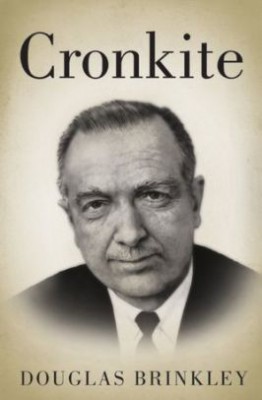 Harper Collins just came out with a new, substantial biography of Walter Cronkite.
Harper Collins just came out with a new, substantial biography of Walter Cronkite.
From the publisher’s release: “Douglas Brinkley presents the definitive, revealing biography of an American legend: renowned news anchor Walter Cronkite. An acclaimed author and historian, Brinkley has drawn upon recently disclosed letters, diaries, and other artifacts at the recently opened Cronkite Archive to bring detail and depth to this deeply personal portrait. He also interviewed nearly two hundred of Cronkite’s closest friends and colleagues, including Andy Rooney, Leslie Stahl, Barbara Walters, Dan Rather, Brian Williams, Les Moonves, Christiane Amanpour, Katie Couric, Bob Schieffer, Ted Turner, Jimmy Buffett, and Morley Safer, using their voices to instill dignity and humanity in this study of one of America’s most beloved and trusted public figures.
For decades, Walter Cronkite was known as “the most trusted man in America.” Millions across the nation welcomed him into their homes, first as a print reporter for the United Press on the front lines of World War II, and later, in the emerging medium of television, as a host of numerous documentary programs and as anchor of the CBS Evening News, from 1962 until his retirement in 1981. Yet this very public figure, undoubtedly the twentieth century’s most revered journalist, was a remarkably private man; few know the full story of his life. Drawing on unprecedented access to Cronkite’s private papers as well as interviews with his family and friends, Douglas Brinkley now brings this American icon into focus as never before.
Brinkley traces Cronkite’s story from his roots in Missouri and Texas through the Great Depression, during which he began his career, to World War II, when he gained notice reporting with Allied troops from North Africa, D-day, and the Battle of the Bulge. In 1950, Edward R. Murrow recruited him to work for CBS, where he covered presidential elections, the space program, Vietnam, and the first televised broadcasts of the Olympic Games, as both a reporter and later as an anchor for the evening news. Cronkite was also witness to—and the nation’s voice for—many of the most profound moments in modern American history, including the Kennedy assassination, Apollos 11 and 13, Watergate, the Vietnam War, and the Iran hostage crisis.”
Here is Patt Morrison’s radio interview with Douglas Brinkley.
ISBN: 9780061374265; ISBN10: 0061374261; Imprint: Harper ; On Sale: 5/29/2012; Format: Hardcover; Pages: 832; $34.99.









